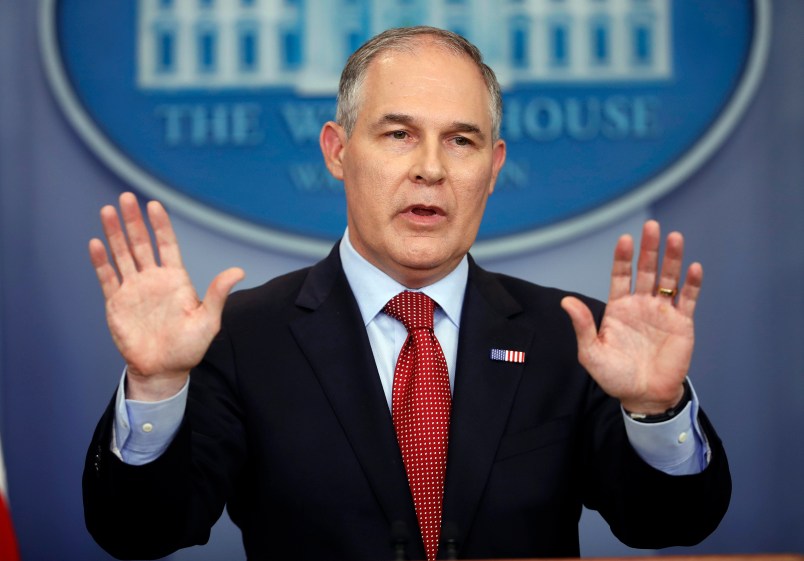Environmental Protection Agency Administrator Scott Pruitt said earlier this week that it is “opportunistic” and “misplaced” for reporters to tie Hurricane Harvey to climate change.
Harvey is the worst rain event in U.S. history, the Washington Post reported Tuesday, while the rain was still falling over Houston. The Post noted separately that the storm had delivered the Houston area its third “500-year flood” in three years — that is, storms so bad they have a 1 in 500 chance of happening in a given year and local area.
In an interview Monday with Pruitt, Breitbart News’ Alex Marlow asked if he had seen the “left-wing media’”s attempts “to make this seem like it’s climate change, that climate change is responsible, it’s actually America’s fossil fuel consumption that’s caused this tropical storm.”
Pruitt said that he hadn’t, given how “focused” he was on the agency’s response to Harvey. Pruitt is known as a close ally of the fossil fuel industry and a skeptic, to say the least, of climate science. Numerous outlets have reported on a Trump administration effort within the EPA to avoid using the term “climate change.”
Marlow pressed: “What would you say, theoretically, if they challenged you and they said that ‘this is something that has only taken place because of climate change,’ what would be your response?”
“I think at this point to look at things like this and to talk about a cause and effect really isn’t helping the people of Texas right now,” Pruitt responded. “And that’s our response, that should be our response, that we want to work together with Texas to ensure that people have safe drinking water, and power’s back on, and we see the right response by each of the federal agencies.”
He added: “So, I think for opportunistic media to use events like this to, without basis or support, just to simply engage in a cause and effect type of discussion, and not focus upon the needs of people, I think is misplaced.”
Though climate scientists are wary of tying specific weather events like Harvey to larger phenomena like climate change, the EPA’s own scientists and researchers have acknowledged its affects on extreme weather.
In the words of an EPA press release, “[r]ising global average temperature is associated with widespread changes in weather patterns. Scientific studies indicate that extreme weather events such as heat waves and large storms are likely to become more frequent or more intense with human-induced climate change.”
The accompanying study, of “Climate Change Indicators” in 2016 data, found that temperatures in the continental United States have risen since 1901, and especially so over the last three decades.
It specified, referring to “Heavy Precipitation” events: “In recent years, a higher percentage of precipitation in the United States has come in the form of intense single-day events. The prevalence of extreme single-day precipitation events remained fairly steady between 1910 and the 1980s but has risen substantially since then. Nationwide, nine of the top 10 years for extreme one-day precipitation events have occurred since 1990.”
Several EPA spokespeople did not respond to TPM’s questions on Pruitt’s remarks and the agency’s studies of climate change.







Thank you for confirming your clueless asshole qualificatons for the Drumpf Badminisration, you fracking idiot…
And the Koch bros. applaud.
Same logic used for Sandy Hook.
“this is something that has only taken place because of climate change”
is the opening premise of a straw man argument. It sounded to me like a soft ball to the sycophantic Pruitt so that he could play to Trump’s base and also nuzzle closer to Trump’s taint.
Sorry this is entirely OT. Is it mentioned here yet?